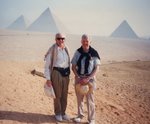



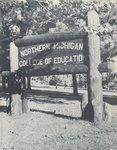

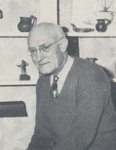

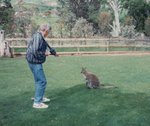
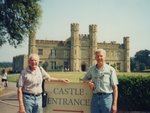
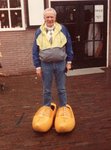
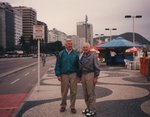
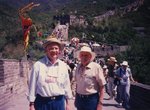
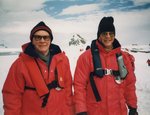
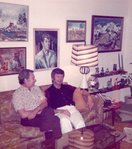
We have only glimpses of earlier generations of same-sex couples because for so long society forced those we today understand as LGBTQ+ people to live largely in secrecy. When Al Hakala and Bob Walker first met in 1946, the consequences of exposure could include arrest, expulsion, being fired, electroshock therapy, and/or rejection by family and friends.
Nonetheless, they forged a relationship that endured.
A native of Marquette, Albert Hakala was the youngest of three children born to a carpenter and his wife, both immigrants from Finland. After graduating high school in 1943, he joined the Hospital Corps of the U.S. Navy. For much of World War II, Hakala was stationed in New Guinea, where he witnessed others receiving dishonorable discharges for homosexuality, a fate he was determined to avoid. Hakala earned his B.A. in 1949 at what was then the Northern Michigan College of Education, now Northern Michigan University.
Robert Walker grew up in Strongs, Michigan, southwest of Sault Ste Marie, the eldest of six children. His father was a grocer and his mother served as postmaster. Walker interrupted his undergraduate studies to serve in the Army Corps of Engineers during the war and received his B.A. from Northern Michigan in 1947.
Both men became educators and both went on to get master’s degrees from Michigan State College, now Michigan State University. Walker spent his career at Lansing Eastern High School as a teacher, counselor and vice principal. Hakala taught in the Lansing Schools during the 1950s. When the superintendent told him that as a single man, he could never be an elementary principal, he took a job on the faculty of Central Michigan University. They dared not be too open.
The white, gay male couple shared a rich, albeit discreet life together over more than five decades, socializing with a group of friends and traveling the world, until Walker’s death at age 80 in 2001.
Now 97, Hakala shared his memories of their early relationship as part of an oral history interview recorded over two afternoons in mid-July. This excerpt is edited for clarity.
Tim Retzloff: I thought we could start with how you met Robert.
Al Hakala: When I got out of the service, some of my friends were spending time in the Upper Peninsula at what we call camps. Anything on the lake or river is called a camp. And for some reason, this wasn't me. I'm not a drinker. I do like to have a drink. But just to go party until you’ve had too much, no. So instead of saying to the guys, I don't want to join you. I decided to go to summer school.
Bob was in the class. Didn't pay any particular attention to him. He was there when I arrived to class. And then I joined a fraternity. They had two at Northern Michigan. They had the Tri Mus, which was all the jocks football, basketball track, and so on. The other one was the Thetas. They were more the arts. As a pledge, I had to kind of cater to the senior members of the fraternity, so I invited Bob to coffee once. And there was nothing romantic involved. I was dating a student nurse. Her name was Ella Mae, and I saw her downtown right before Christmas. And I said, “Let's go to the Mini Club and dance tonight.” And she said, “I'd like to, but I promised Peg”— that was her roommate—"that I do something with her.” And I said, “If I could find a date for Peg, would you change your mind?” And she said, “Oh, yeah.” Peg was a good-looking redhead that I had known for a number of years and dated some of the guys that I used to hang around with. I called a couple people. They were busy. So, I decided to call the fraternity house. First person that answered the phone, I'd say, “How about going out on a blind date?” Well, Bob answered the phone. He said, “Yes.” Everyone had the best time. It was one of those magical nights for the two of us.
How so?
We just blended together. The girls were wonderful. We laughed. We danced. Then the girls had a curfew. And then Bob and I went out to the Tip Top. And we just talked and talked and talked. There was something between us, a connection. He delayed going home so he could spend more time with me during the month of December. But he did go home for Christmas. And he did make sure that he got back for New Year’s so that we could spend the time together. Bob said, “I wasn't gay until I met you.” I said, “How was this possible?” He said, “I don't know, but there was a physical attraction for me.”
What was your sense of yourself at the time? Did you have any idea of feeling different?
Well, I was born in ‘25. My father told me a couple of times that I was an unwanted child because they couldn't afford me. And he told me more than once that I was an unwanted child. Which didn’t please me. By then I knew what I was. I mean, I knew I preferred men to women. I would play with my friends who happened to be a couple of years older. They’d use words like “cocksucker” and “queer” and they'd make remarks, “I'd like to kill all those bastards.” And, you know how horrible I must’ve felt when I was hearing that from my friends. I couldn't discuss it with anybody. I couldn't tell anybody. Even in high school, I couldn't share my feelings with anyone. Bob was the first person that I really could share my feelings with. And I think that was a connection that I had. And Bob shared his feelings with me.
Bob had a birthday in March, March 21. He was a spring baby. And I said I'd take him to dinner. And we had a nice dinner. There was a lot of touching and holding hands and rubbing knees but there wasn't anything other than that. My birthday was in May, May 15. And Bob said, “Well, we will celebrate your birthday. But we need something in between. In April, a reason to celebrate.” So, we decided when we would meet. At that time, we did something very unusual. We wanted a name for the April gatherings. And we decided what in the world could we call it, and we talked about it and talked about it. It finally ended up we're going to call it “wara,” W-A-R-A. The W-A for— My first name was Waino, Waino Albert, but when I came out of the service, I changed it to W period Albert. I changed my name because Waino was my father's first name. And I didn't want to carry his name. So it was W-A, and R-A were Bob’s initials for Robert Allen. W-A-R-A. And if people went out to restaurants and people asked, “What does wara mean?” we had an eye out for that. We had W-A for Walker and R-A for Robert Allen, so it had a double meaning, ours and the outer world. So that was that was one thing we did.
So, there was a level of secrecy that you felt you had to maintain?
That’s right. And then we decided we wanted to go to California. The two of us. So, we hitchhiked to California.
Ah, this was 1947, when Kerouac was taking his road trips out there.
I had a couple of aunts who lived in San Pedro. When school ended in June, we left from my home, went to Bob’s home, spent a couple days. And then Bob's brother Charles drove us to the highway. It was the northern route. We got some rides. We got one ride that we felt very uncomfortable with. That was a truck that picked us up, and they were a little crowded and they stopped at a bar and they said we could join them. And we said, “No we'd rather get on the highway.” And we got on the highway and there was a motel nearby and we stayed there. And we were on the road around 8 o'clock the next morning. We were going towards the Black Hills, Mount Rushmore and we were picked up by a minister. He was very, very religious, one of those offbeat religions. He told us when he had to turn off at this next intersection. He said, “Before I let you out, I’d like to pray with you.” He asked us about our religion. Bob was a Baptist. I was a Lutheran. Anyhow we got out the car and prayed and prayed and prayed and prayed and prayed and prayed. And all these cars were going by. I looked at Bob and Bob looked at me. Well finally it was over. We got on the highway. I think three or four cars passed us, then somebody picked us up. They had been to Lansing and had a new Oldsmobile. And they were a nice young couple, we enjoyed talking with them. When they wanted to stop for the evening, they said, “We're going to stop at this motel. If you'd like to join us in the morning, be ready by eight o'clock.” We were ready at quarter of eight. On the second day they had told us they were driving to California, and we could ride with them all the way to California. And they were going to, in fact, the same area that my aunts were. They wanted us to go home with them to spend a couple of days. Anyhow, we begged off. We got a hotel. Well, you know, two novices. What do we do now? Because we hadn’t had any kind of sex or anything. We didn't know what to do. I knew, though, what I thought the penis was for and we played with each other.
So, this was on the trip that you broke the ice?
No, when we arrived in California. Anyhow, we sucked each other's cocks. Yeah. And Bob says, “I've got to go to a drugstore.” I said, “What for?” He said, “I want to get some Lavoris to wash my mouth out.” And then we went to my aunts and stayed with them. We (later)went down to Mexico. And we thought, well, we're not going to take any clothes with us. We'll just get the bus and spend the night in Mexico and we can wash out our underwear and shirts and sleep nude and they'll be dry in the morning. Tijuana was humid. When we woke up in the morning the clothes were not dry. But anyhow, we managed. Then we decided to go to Sequoia National Park and look for work. I was a housekeeper and Bob worked washing pots and pans. Bob hated what he was doing. After a week, Bob said, “I've got to quit. I can't do this.” So, we got our pay after a week and moved on to Yellowstone for a few days. Then it was time to get back to Michigan. We got on the highway to hitchhike. No luck. No luck. Bob said, “Let's take a bus back.” It was the cheapest mode of transportation because we couldn’t get a ride.
So, travel was part of your togetherness from the start?
Right. Yeah. Sometime after that trip, we said our vows. We decided it was going to be a monogamous relationship.
Had you by this point, met other people who are gay?
Yeah.
Tell me about that a little bit.
The adviser to the fraternity was Earle Parker, and Earle Parker we knew was gay. He taught at Northern, taught Latin. He became a good friend of ours. We didn't talk freely about him. But we used his camp, as I say, as a getaway. It was on Middle Island Point, I think. He let us stay out there on weekends if we wanted. He invited us to his dinners. He was a wonderful cook. He said to us once, “What kind of music do you like? Well, we were a couple of hicks in Northern Michigan. I don't know if we said Ella Fitzgerald or something. “No,” he said, “MUSIC. Opera and classical music.” I'd never listened to opera or classical music. Neither had Bob. So, he kind of introduced us to, to that type of music. But yeah, when we came back from California, he looked at us. “You mean to tell me you still are friends after spending a summer together?” he said. “Yes, closer than ever.”
(Tim Retzloff teaches history and LGBTQ studies at Michigan State University.)
Support City Pulse - Donate Today!
Comments
No comments on this item Please log in to comment by clicking here